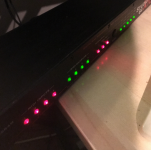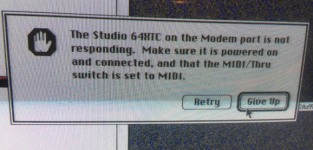yes the 64XTC works fine on a windows computer!!!!!!! recently hooked it up to a pII 266Mhz slot 1 440bx board running windows 3.1 works 100% running windows 95 works 100%
back to the 5200CD...
for the record there is no Modem in the commslot
i just pulled out the motherboard to check... theres no commslot modem installed
only a Farallon PDS network card that i ordered from Ebay
the modem interface is connected on modem serial port
the printer port has nothing connected
the scsi is attached to an external ZIP100 plus which works fine
its connected to my local network via 10BASE-T port on the PDS card
>> Calling on TN1018 is of questionable value at this point, because as you discovered earlier, it looks like these particular SerialDMA drivers pertain to machines other than the 5200.
fact: the textfile for the v2.0.2 serialDMA extension does not mention the performa 5200
BUT! the text file included with v2.0.2 describes the information clearly:
What is the SerialDMA 2.0.2 extension?
Version 2.0.2 of this extension is simply version 2.0 of this extension plus a couple of additional fixes and support for
the new PCI Power Macintosh computers (7200, 7500, 8500, and 9500).
Version 2.0 of this extension was a complete rewrite of the DMA serial driver which originally accompanied the:
Centris 660AV, Quadra 660AV/840AV, Power Macintosh 6100/60, 6100/66, 7100/66, 7100/80, 8100/80, 8100/100, 8100/110.
It also supports the various Performa and Apple Workgroup Server products derived from the models listed.
The SerialDMA driver is a replacement for the standard set of Macintosh serial device drivers referred to by their driver names:
�.AIn,� �.AOut,� �.BIn,� and �.BOut.�
SerialDMA is applicable only to the set of Macintosh models which incorporate DMA channels servicing the standard Z8530 SCC(Serial Communications Controller)
The original serial driver for these products suffered from occasional system hangs, communications timeouts, poor communications performance, and various other glitches.
The new SerialDMA 2.0.2 driver corrects these problems and provides the targeted products with a serial driver that should exceed the performance and reliability standards for serial communications on the Macintosh platform.
lets get our proper logical thinking caps on
notice it says "the NEW 7200, 7500, 8500 + 9500" so one can dedeuce this file obviously originates from 1995!!
fact: the 2.02 serialDMA extension says it was created on October 23rd 1995
so; the next logical question would be to confirm: does the 5200CD use the Z8530 controller?
well lets refer back to the taylor design article:
http://www.taylordesign.net/classic-macintosh/the-mythical-road-apple/
"An 8530 SCC serial port controller was embedded in the F108 ASIC. The developer note documents the handshake pins and specifically notes that the GPi pin for each port is connected to the controller and available for use. The GPi pin is what’s missing from earlier entry level Macs that limits their transfer speeds."
so in this article the writer is saying that his 6300 performa can handle a 56k modem, and that it also contains the F108 ASIC which
according to him (?) also contains the 8530 SCC.
but can we logically assume that if its present on the 6300 should it not be present on the 5200?
i would guess NO you cant logically assume that because the 5300/6300 + 5400/6400 series were different in many ways from the 5200/6200 series.. right??
so we need to confirm somehow that this is a docmented fact that the performa 5200CD does include this F108 ASIC, and that it is true whether or not it contains the 8530 SCC.
http://www.gla.ac.uk/~gwm1h/macos7.6/aboutappleremoteaccess.html this document says:
In order to use the serial port at 115200 bps on one of these computers, you need a new serial extension called SerialDMA. System 7.5.3 or later incorporates this driver into the operating system.
that being said. i have just now installed the serialDMA extension and i thought at first that it was crashing my system; but no.. its fine.. and ive got the extension activated
im just trying to get a proper MIDI app installed to do some realworld testing!
fact: when i first tried to install this version of the serialDMA extension, my performa froze on startup screen but its working now?? strange
this page looks pretty relevant:
http://wikivisually.com/wiki/Macintosh_Performa_5200CD


